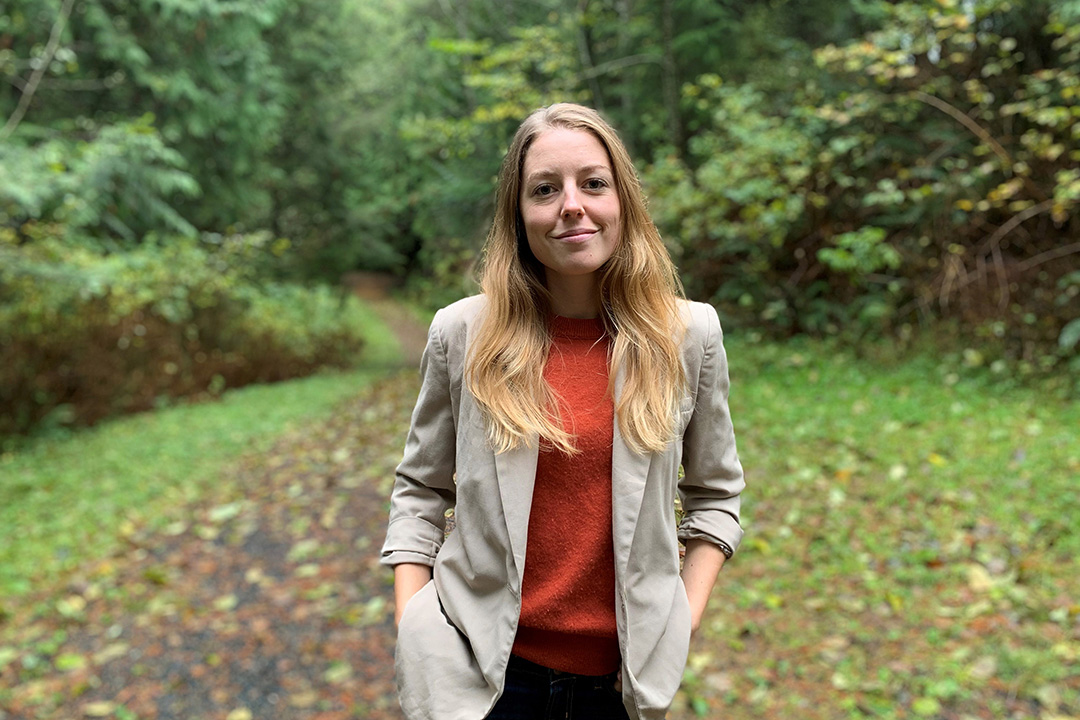
Veterinary field epidemiology program fills unique niche
Dr. Caitlyn Best is about to add a few more letters to her already lengthy set of professional credentials, becoming the first person to graduate from Canada’s only master’s program in veterinary field epidemiology.
By Jeanette NeufeldBest, a 2016 graduate of the Western College of Veterinary Medicine (WCVM) Doctor of Veterinary Medicine program, was the first student enrolled in the new graduate program offered at the college. She will receive a Master of Science degree at the University of Saskatchewan’s fall convocation ceremonies on Nov. 10.
This graduate program in field epidemiology fills a unique niche in veterinary medicine and is one of only a handful of its kind worldwide. While the program’s focus is on animal health, it also allows students to make connections between human and public health issues.
“There are very few [programs] that are just specific to veterinarians,” says Dr. Tasha Epp, an epidemiologist and an associate professor in the WCVM’s Department of Large Animal Clinical Sciences.
“A lot of what we’re seeing in the animal health world is that there’s a need for some of these skill sets, for individuals who are either working for provincial or federal governments,” says Epp, the program’s creator. “They are important skills that otherwise would be learned on the job. Here we provide an opportunity where they can learn by doing.”
Best joined the Canadian Food Inspection Agency (CFIA) in 2017 after working in private practice in British Columbia. She always had an interest in regulatory medicine and saw the graduate program as a logical next step in her career.
“When I saw that this particular program existed, it seemed like a practical way to get epidemiology training — and at the same time, [a way to] work on projects with different groups and agencies,” says Best.
While completing the program, Best focused on six different skill sets and completed a project for each skill set. These competencies included disease outbreak investigations, risk communication, disease surveillance, dataset analysis, risk assessment and diagnostic test evaluation.
One portion of her program was a study of testing methods for lead toxicity in cattle. Her work has laid the groundwork for a new testing procedure that could potentially help the WCVM’s Disease Investigation Unit save money for future lead toxicity cases in herds.
Best used her project as the basis of a research paper that has been accepted for publication in the Canadian Veterinary Journal.
When the COVID-19 pandemic led to nationwide lockdowns in March 2020, Best returned to B.C. to complete the rest of her program remotely. During this time, she assisted a veterinary team from the B.C. Ministry of Agriculture, Food and Fisheries as they worked to investigate COVID-19 outbreaks in B.C. mink farms.
Best also worked collaboratively with the CFIA on a large dataset of chronic wasting disease (CWD) information and performed a gap analysis of CWD for the Saskatchewan Ministry of Agriculture.
“It’s been really good for networking. The [program’s] project nature means your projects are more succinct, and you do multiple projects with different groups,” she says.
In addition to her project work, Best successfully wrote her board certification examinations for the American College of Veterinary Preventive Medicine — a veterinary specialty organization recognized by the American Veterinary Medical Association.
Overall, the WCVM’s graduate program allowed Best to explore many different facets of veterinary epidemiology in a way that will allow her to progress her career. Her role with the CFIA has already expanded since completing the program.
“It’s good to see that it’s benefited her career,” says Epp. “Your first student — there’s always growing pains and things you learn on the fly. But I’m glad that we took on the program. I’m glad it’s here. I think it will provide a good niche for people who don’t want to do a thesis but still want to learn some good epi [epidemiology] principles.”
While Epp didn’t take on another student last fall due to COVID-19, applications will be accepted beginning in December 2021.
For Best, she says completing the program really marks the beginning of her journey into epidemiology.
“The more you learn, the more you realize there’s more to know,” she says. “I look forward to expanding on these concepts in the future. It’s a great start and it’s provided me with many unique opportunities.”
Article re-posted on .
View original article.

